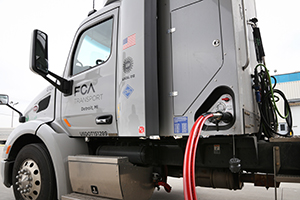Trucking Companies Remain Committed to Alternative Fuels Despite Low Diesel Prices

About five years ago, when diesel prices were averaging around $4 a gallon, John Sheehy began looking into alternative-fuel vehicles as a potential solution to rein in his trucking company’s rising costs.
He recalled some skepticism initially whether trucks equipped with engines fueled by compressed natural gas could perform as well as a traditional diesel-powered semi. The gamble paid off and now is considered a trail blazing decision.
Today, nearly all of the 100 trucks used by Waterloo, Wisconsin-based Sheehy Mail Contractors Inc. run on CNG. The company recently was presented the Forward Fleet Award by Wisconsin Clean Cities for its use of alternative fuels and leadership in the field.
“We’ve made the investment, and it’s turned out well for us,” said Sheehy, CEO of his fourth-generation family trucking business, which launched in 1952.
Federal regulatory requirements to lower greenhouse-gas emissions also have pushed the transportation industry to explore an assortment of cleaner burning fuels including CNG and propane. Even as air quality standards became more stringent, trucking companies sought cleaner vehicles that could rival the performance of traditional equipment that ran on widely available fuels.
Sheehy said companies including engine producer Cummins have stepped up to develop technology that could deliver performance as well as take advantage of cleaner fuels.
Growing use of alternative fuels also has led to private investment in networks to provide these fuels to customers in recent years. Use of CNG alone has grown at an average annual rate of 30.6% since 2000, according to industry estimates, though network expansion has slowed recently because of falling prices for traditional fuels.
Despite diesel costs falling from nearly $4 to a recent national average of about $2.56 per gallon, Sheehy said it still makes sense to invest in trucks that run on CNG. He said a traditional diesel truck may cost about $120,000 while a truck that runs on CNG may add upward of $50,000 to that price.
CNG today costs about $2.11 per gallon nationally, CNGNow.com reports. Sheehy said he contracts with CNG suppliers on routes regularly used by his firm to get the best pricing possible for his fleet.
“As we use these [CNG trucks] for long hauls, [CNG] still is the perfect fuel for us because we’ll spend about half the price on fuel than we would on diesel,” he said.
Because CNG burns cleaner than traditional fossil fuels, that translates to lower carbon emissions, which means less residue buildup and wear on an engine. It also means longer engine oil life, resulting in lower maintenance costs.
Dane County in Wisconsin began incorporating CNG vehicles into its fleet about six years ago. Today the county has about 75 CNG vehicles, which include snow plows and some vehicles used by the parks department.
The county also has the advantage of being able to fuel its vehicles a majority of the time with CNG collected through a biogas system fed by the county landfill in the town of Cottage Grove.
“Bio CNG costs us about the equivalent of about $1.50 a gallon [in gasoline],” said Dane County Executive Joe Parisi. “So even when gas prices were dropping, using CNG was still a less expensive option for us.”
The county estimates use of CNG saved about $50,000 in fuel costs in 2016, a figure that could hit $150,000 by 2018.
Parisi said county staff who would use the CNG vehicles for work tested the vehicles before a decision was made to adopt the technology.
“We’re continually looking at ways to do things more efficiently and, as with any new technology, there may be some skepticism, but we’re always open to innovation,” he said.
Tom Melms began using alternative fuels decades before it became an emerging trend. Less than three years after he purchased Badger Cab Co. in Madison in 1978, he had the company’s fleet of cabs running on propane.
At the time, the decision to convert to propane was to use a cheaper fuel source, Melms said. He said he couldn’t just raise fares to compensate for rising fuel costs because that meant getting state and city approvals, which would have taken months, so Melms sought a different solution.
He partnered with a company in New Holstein that was converting school buses to run on propane. His own team of mechanics eventually learned how to convert gasoline engines to run on propane.
Melms said that in the 1980s, it cost about $1,200 to convert a gasoline engine to run on propane. A conversion today may cost between $2,500 and $3,000.
The investment is worth it, Melms said. Similar to CNG, propane burns cleaner, which means longer engine life.
“We usually can double the oil life in our cabs,” Melms said. “There’s a lot of other savings besides the fuel costs.”
Melms keeps a 30,000-gallon propane tank at his business, which allows his company to buy fuel at a cheaper bulk rate. Wholesale propane is selling for about 88 cents a gallon, according to the Energy Information Administration.
Though Melms advocates use of propane as a clean and affordable fuel, he concedes it may not be the right option for businesses with large fleets or individual drivers looking to save on fuel costs. He said a propane-fueled cab has a range of about 200 miles, which works fine for his company since most of his business is conducted within a 30-mile radius of Madison.
“It makes sense for a business if your fleet travels in a confined area, because there just isn’t as many places to fill up with propane like you can with CNG or other fuels,” he said. “But if your fleet is confined to a specific area, it boggles my mind why people would not do it.”
Lori Lisek, executive director of Wisconsin Clean Cities, said the state has been progressive in its adoption of alternative fuels.
“There are several major fleets operating in Wisconsin that use CNG on a daily basis,” she said. When diesel fuel prices were topping $4 a gallon, there was much interest in CNG vehicles, especially in trucks that could deliver comparable performance as traditional diesel trucks.
While technology advancements answered performance concerns, the cost of CNG trucks versus diesel trucks deterred some companies from making the switch, Lisek said. The cost differential could range between $50,000 and $100,000 per truck.
Wisconsin Clean Cities, which grew out of a Department of Energy initiative, launched a program a few years ago that provided grants to trucking companies to help offset the additional cost of a CNG truck. The group is working to secure additional funds for this effort.
Lisek said some Wisconsin trucking companies, including Sheehy, made the investment in CNG equipment even without grant support, simply because “it was the right thing to do.”
Lisek said numerous studies have shown how businesses saved money turning to CNG.
Paper Transport Inc. in Green Bay found between 2011 and 2012, a standard diesel truck used between 16,000 and 18,000 gallons of diesel fuel. A comparable amount of CNG would have cost about $1 less per gallon at that time. The company said the lower fuel and maintenance costs on a CNG truck would help it recover the higher cost of the equipment over the life of the vehicle.
Lisek said federal rules requiring businesses to lower emissions and decrease their carbon footprints have spurred them to hire transport companies that are making similar efforts.
“For that purpose, many transport companies are switching to CNG,” she said. “It’s also allowed for smaller companies to haul for bigger clients.”
Sheehy estimates his company’s use of CNG vehicles has reduced its carbon footprint by more than 50%.
Sheehy also serves as president of the National Star Route Mail Contractors Association and said the group is working to encourage its members to consider converting to CNG.
Sheehy said the U.S. Postal Service accounts for about 50% of his company’s business. He said the postal service wants its contract firms to increase use of clean fuels.
“Now when contractors bid on postal service work, part of that proposal has to include sustainable clean energy use,” Sheehy said. “We’ve proved it can work.”
Momentum may be returning to alternative fuel use, but some organizations still need convincing.
Madison Gas and Electric Co. said low gasoline and diesel fuel prices have waned interest in CNG vehicles, but those who maintain fleets continue to support the technology.
“MGE’s involvement right now is really in a role of education,” MGE spokesman Steve Schultz said. “We do work with businesses to help them figure out if it makes sense from an economical/business/environmental standpoint to make a switch.”
There are 948 locations in the United States where CNG is commercially available, the Alternative Fuel Data Center reports. A total of 44 of those sites are in Wisconsin.
La Crosse-based Kwik Trip sells CNG at 34 locations across Wisconsin, Minnesota and Iowa. Three of its Madison-area locations — Lake Mills, Windsor and Verona — sell CNG.
Joel Hirschboeck, spokesman for Kwik Trip, said the company has no immediate plans to expand its CNG network, though if demand rises or fleet-specific need warrants an additional site, the company will review it.
“Demand has been stable in our footprint,” he said. “Fleets and vocational operators have the most interest in CNG.”
Lisek said the Illinois-based Gas Technology Institute recently was awarded a $4.9 million Department of Energy grant to kick-start development of multifuel stations along Interstate 94 between Michigan and Montana. CNG and charging stations for electric vehicles would be among the options offered.
Some people have been reluctant to buy alternative fuel vehicles simply out of concern of limited availability of places to fill up, Lisek said. Creation of a “clean fuel corridor” across several states would be a step to curb that fear.
“For the past few years, we’ve been working with many partners to see where these kinds of stations are needed to help [trucking] companies fill those gaps in their routes,” she said.




